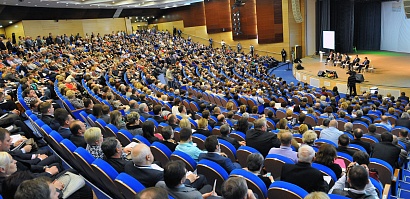The results of the expert conference of NTI "Autonet" on the topic "New approaches and business models. Trends in the transport and urban smart mobility market"
25 august 2022

25 august 2022
On August 24, as part of the Future Mobility section of the MIMS Automotive exhibition, an expert conference of the NTI "Autonet" was held on the topic "New approaches and business models. Trends in the transport and urban smart mobility market".
The conference was moderated by Pavel Kozlov, DARTCOM Development Director.
Victoria Sinichkina, Director of Consulting Services for companies in the automotive industry "Trust Technologies", was the first to present her report. In her speech, Victoria shared with experts her vision of international trends in the digital transport mobility market. The development of autonomous and connected cars, as well as the Future mobility industry as a whole in the world, is coming late, because this is a new industry and a detailed approach to development is required. Russia is at a decent level among the leading countries in this segment. Victoria also noted that the demand for carsharing and kicksharing is actively growing among consumers, and the share of public transport is increasing. This has huge advantages for urban space, so we can expect that cities will support the development of the transport rental segment. Firstly, it saves space allocated for parking. Secondly, these solutions are energy efficient and they have economic benefits.
After Victoria's speech, a discussion was organized with key industry experts. Thus, the chairman of the Association for the Development of Electric Vehicle Transport and Infrastructure (AETI), Iya Gordeeva, talking about changes in transport logistics, said that big changes are waiting for us in the next five to seven years.
"At the first stage, we will have electric cars, because the structure of an electric car requires 30% less parts. The control program for each part as a node is available. If we talk about the structure of mobility in general, then I think it will be electric cars in cities, hydrogen on highways."
She was supported by Lenar Kashapov, head of the Future Mobility consortium Innopolis. In his opinion, there will be more electric vehicle manufacturers in the future, but they will be smaller in size.
According to Konstantin Trofimenko, director of the Center for the Study of Transport Problems of Megacities at the Higher School of Economics, the concept of urban mobility – mobility on demand - will be actively developed within the framework of smart cities. However, if we are talking about the mobility of the future, then it is impossible not to take into account other aspects: general plans, transport planning, urbanism, etc.
Speaking about digital transport mobility, it is impossible not to mention the development of public transport. Maxim Isaev, Deputy General Director of DATAPAX, said that due to the penetration of digitalization in this area, more and more companies are switching to a forecasting model. This has become possible thanks to the use of big data.
Alexey Volostnov, partner at Strategy Partners, made the next presentation. He spoke about the "smart" infrastructure in the field of transport and what prospects the industry will have in the near future. Thus, investments in ITS in 2021 in Russia amounted to 3.9 billion rubles, while the costs of road construction are much higher. At the same time, we see how the demand for multimodal digital transport solutions is growing today. In 2021, the cost growth amounted to 70 billion rubles. By 2030, the need will increase tenfold.
After Alexey's speech, the moderator of the conference gave the floor to key industry experts.
Vladimir Leonov, General Director of Avtodataspace, noted that the car generates a huge array of data every day, which are used to create various services. However, the question of the ownership of this data is now more acute than ever.
"If the machines of previous generations use 15-18 parameters to collect information, then in modern ones – up to 300. While there is a discussion about who they belong to. Automakers consider them their own, we believe that the owner of the information created by the car is the owner of the car."
Vladimir also added that the Avtodata telematics platform will be launched in Russia by the end of the year. It will control the processes of data collection, storage, processing and commercial distribution in the transport industry. Avtodataspace company will be the operator of the system.
According to Artem Nikitin, CEO of V2Lab, all automotive devices of smart cities will not only transmit data to unified traffic management centers, but also interact with each other using, among other things, V2X technologies. At the same time, Artem is confident that huge amounts of data will not collapse the entire infrastructure, since they are located in the cloud.
Speaking about transport telematics, Igor Heresh, CEO of Exodrive, noted that the pandemic has contributed to the emergence of new technologies in this industry that did not exist before. The expert sees a window of opportunity in the products of those companies that work at the junction of telematics and Fintech.
One of such solutions is a product of Simble company – short-term casco insurance for a specific trip along sections of toll roads.
"Insurance for the route along the M-11 Neva highway with coverage for 1 million rubles can be purchased for only 350 rubles. This new business model will allow millions of users to be involved in the insurance process," said Stanislav Pushevsky, CEO of IT insurance products company Simble.
The experts of the forum unanimously noted that the transport industry is now facing unprecedented challenges and in order to successfully overcome them, it is necessary to move from paper import substitution projects to real production.
The conference was moderated by Pavel Kozlov, DARTCOM Development Director.
Victoria Sinichkina, Director of Consulting Services for companies in the automotive industry "Trust Technologies", was the first to present her report. In her speech, Victoria shared with experts her vision of international trends in the digital transport mobility market. The development of autonomous and connected cars, as well as the Future mobility industry as a whole in the world, is coming late, because this is a new industry and a detailed approach to development is required. Russia is at a decent level among the leading countries in this segment. Victoria also noted that the demand for carsharing and kicksharing is actively growing among consumers, and the share of public transport is increasing. This has huge advantages for urban space, so we can expect that cities will support the development of the transport rental segment. Firstly, it saves space allocated for parking. Secondly, these solutions are energy efficient and they have economic benefits.
After Victoria's speech, a discussion was organized with key industry experts. Thus, the chairman of the Association for the Development of Electric Vehicle Transport and Infrastructure (AETI), Iya Gordeeva, talking about changes in transport logistics, said that big changes are waiting for us in the next five to seven years.
"At the first stage, we will have electric cars, because the structure of an electric car requires 30% less parts. The control program for each part as a node is available. If we talk about the structure of mobility in general, then I think it will be electric cars in cities, hydrogen on highways."
She was supported by Lenar Kashapov, head of the Future Mobility consortium Innopolis. In his opinion, there will be more electric vehicle manufacturers in the future, but they will be smaller in size.
According to Konstantin Trofimenko, director of the Center for the Study of Transport Problems of Megacities at the Higher School of Economics, the concept of urban mobility – mobility on demand - will be actively developed within the framework of smart cities. However, if we are talking about the mobility of the future, then it is impossible not to take into account other aspects: general plans, transport planning, urbanism, etc.
Speaking about digital transport mobility, it is impossible not to mention the development of public transport. Maxim Isaev, Deputy General Director of DATAPAX, said that due to the penetration of digitalization in this area, more and more companies are switching to a forecasting model. This has become possible thanks to the use of big data.
Alexey Volostnov, partner at Strategy Partners, made the next presentation. He spoke about the "smart" infrastructure in the field of transport and what prospects the industry will have in the near future. Thus, investments in ITS in 2021 in Russia amounted to 3.9 billion rubles, while the costs of road construction are much higher. At the same time, we see how the demand for multimodal digital transport solutions is growing today. In 2021, the cost growth amounted to 70 billion rubles. By 2030, the need will increase tenfold.
After Alexey's speech, the moderator of the conference gave the floor to key industry experts.
Vladimir Leonov, General Director of Avtodataspace, noted that the car generates a huge array of data every day, which are used to create various services. However, the question of the ownership of this data is now more acute than ever.
"If the machines of previous generations use 15-18 parameters to collect information, then in modern ones – up to 300. While there is a discussion about who they belong to. Automakers consider them their own, we believe that the owner of the information created by the car is the owner of the car."
Vladimir also added that the Avtodata telematics platform will be launched in Russia by the end of the year. It will control the processes of data collection, storage, processing and commercial distribution in the transport industry. Avtodataspace company will be the operator of the system.
According to Artem Nikitin, CEO of V2Lab, all automotive devices of smart cities will not only transmit data to unified traffic management centers, but also interact with each other using, among other things, V2X technologies. At the same time, Artem is confident that huge amounts of data will not collapse the entire infrastructure, since they are located in the cloud.
Speaking about transport telematics, Igor Heresh, CEO of Exodrive, noted that the pandemic has contributed to the emergence of new technologies in this industry that did not exist before. The expert sees a window of opportunity in the products of those companies that work at the junction of telematics and Fintech.
One of such solutions is a product of Simble company – short-term casco insurance for a specific trip along sections of toll roads.
"Insurance for the route along the M-11 Neva highway with coverage for 1 million rubles can be purchased for only 350 rubles. This new business model will allow millions of users to be involved in the insurance process," said Stanislav Pushevsky, CEO of IT insurance products company Simble.
The experts of the forum unanimously noted that the transport industry is now facing unprecedented challenges and in order to successfully overcome them, it is necessary to move from paper import substitution projects to real production.
 Autonet
Autonet
